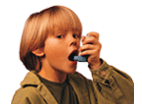









 |
|
Allergy & Asthma Advocate: Spring
1999

How to Implement an Asthma Camp in
Your Area
by Wilma C. Light, M.D.,
FAAAAI

Wilma C. Light, M.D., FAAAAI, assists a
young
camper at "Camp Breathe
E-Z" | |
Day asthma camps are a great way to reach
your community and provide asthma education. These camps allow children
to interact with other children who have asthma, so they realize they’re
not alone in managing their disease. They also learn that, with proper
management, asthma can’t stop them from having fun!
The only things needed to set up and conduct
a camp are the five "V"s and an "R": Vision, Vim and Vigor, Volunteers,
Variety and Resources. Following is a description of an asthma camp
we’ve been running in our community. Hopefully, this description will
encourage other parents and physicians to set up asthma camps in their
communities.
The camp’s beginnings
The roots of our camp, "Camp Breathe E-Z," were
established fourteen years ago by several visionary pediatric nurses at
Latrobe Area Hospital who thought it would be helpful to have a day for
patients to come and learn about asthma. The first meeting was held at a
local park. Today, the program serves children throughout Western
Pennsylvania through the auspices of the American Respiratory Alliance
of Western Pennsylvania, formerly the local American Lung Association
chapter. Over the last 14 years, 8,385 children have been able to attend
the camp and learn about their asthma. In 1999, 14 camp sessions are
slated to be offered, free of charge, to children in the
region.
Learning made fun
The objective of asthma day camp is to make learning fun and
interactive. As the children report for registration, each brings forms
previously completed by his or her parents or caretakers. Each child is
examined and the camper’s recent history of asthma symptoms is reviewed.
Peak flow readings for each child are then taken, and arrangements made
for the administration of any necessary prescription medications during
the day and evening.
After an introduction, campers are separated
into small groups. The groups tour different stations where they learn
information such as proper use of an inhaler and how to use a peak flow
meter. They also learn proper asthma management and review a plan of
action. Parents may either accompany their children or attend an
educational session directed to them, hosted by a local physician(s).
After a picnic-style lunch (usually pizza), campers are offered the
chance to go swimming while their parents receive further education on
the treatment and management of asthma.
At the end of the day, each camper receives
an award for attending the camp, and donated giveaways such as t-shirts
and gym bags.
Volunteers and sponsors
essential
The vim and vigor
in asthma camps comes from volunteers. We have a professional organizer,
Jeannie Simms, who enables everything to run smoothly. She is the person
who does all the legwork and ensures that all activities fall into
place. Others who work at the camp include physicians, nurses,
respiratory therapists, home health care personnel, emergency personnel,
dieticians, junior and senior counselors and community
volunteers.
While there are some similarities every year,
the camp always offers variety. This past year, a speaker from the
Department of Health spoke about a program offering health insurance to
uninsured children.
Our resources are provided by our sponsors,
including including local pharmaceutical firms, which provide peak flow
meters and t-shirts; hospital staff, who help with the lunch; and local
pizza shops, which donate the lunch food.
The format of Camp Breathe E-Z emphasizes
interactive learning. Often, we work with the parents on themes of
concern to all of us, such as how to interface with the local school to
ensure that children’s asthma is properly managed while in the
classroom. Parents offer useful suggestions. Each "learner" is then a
teacher.
For more information on asthma camps in
your area, contact the Consortium on Children’s Asthma Camps. Sponsors
of this collaborative organization include the American Academy of
Allergy, Asthma and Immunology (AAAAI), the American Academy of
Pediatrics, section of Allergy and Immunology, the American College of
Allergy, Asthma and Immunology, the American Lung Association, the
American Thoracic Society and the Asthma and Allergy Foundation of
America.
For the most recent listing of asthma
camps, visit the Patient/Public Resource Center of the AAAAI’s Web site,
or call the Consortium on Children’s Asthma Camps at the American Lung
Association, 1-800-LUNG-USA.
<back> |